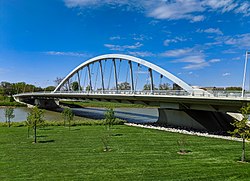This is an old revision of this page, as edited by Ɱ (talk | contribs) at 16:58, 11 August 2020. The present address (URL) is a permanent link to this revision, which may differ significantly from the current revision.
Revision as of 16:58, 11 August 2020 by Ɱ (talk | contribs)(diff) ← Previous revision | Latest revision (diff) | Newer revision → (diff) Bridge in Columbus, Ohio| Main Street Bridge | |
|---|---|
 | |
| Coordinates | 39°57′22″N 83°00′24″W / 39.956051°N 83.006596°W / 39.956051; -83.006596 |
| Carries | |
| Crosses | Scioto River |
| Locale | Columbus, Ohio |
| Maintained by | Ohio Department of Transportation |
| ID number | 2503220 |
| Characteristics | |
| Design | inclined arch |
| Total length | 700 feet (210 m) |
| Width | about 65 feet (20 m) |
| Longest span | 400 feet (120 m) |
| No. of lanes | 2 eastbound, 1 westbound, 1 pedestrian |
| History | |
| Construction start | 2006 |
| Construction end | July 2010 |
| Opened | July 30, 2010 |
| Location | |
The Main Street Bridge in Columbus, Ohio is a 700 ft (210 m), three-span, inclined tied arch bridge over the Scioto River. The bridge is the first in North America and the fifth in the world to use an inclined single-rib-tied arch superstructure. The final cost for the bridge was $60.1 million. It carries U.S. Route 62 and Ohio State Route 3.
History

The original Main Street bridge was a multiple-span, art-deco open-spandrel concrete deck arch bridge, built in 1937. After years of degradation due to weather and traffic, the bridge was deemed unfit for use and closed in 2002.
Wanting an iconic structure to replace the old bridge, the city of Columbus contracted Dr. Spiro Pollalis, professor of design technology and management at the Harvard University Graduate School of Design to design the bridge. His design, altered slightly for budget reasons, opened for traffic on July 30, 2010.
When the former bridge closed, engineers estimated that a replacement would cost approximately $19.5 million. However, by 2004, estimates climbed $29.5 million. When planners received construction bids in 2006, the lowest was $44.1 million. Cost overruns, design changes and inspections added another $10 million to the structure's final cost.
Design

Arch
The original concept of the Main Street bridge was far more complex and costly than the final design. Initially, the bridge called for a very shallow 10:1 span-to-rise ratio for the main arch, creating significant axial and bending forces. To accommodate the excess forces, the design called for expensive, high-strength concrete and steel to support the bridge. Because of the high cost of materials and construction of such a span, the design of the arch was revised to a 6.6:1 span-to-rise ratio, making the main arch taller and decreasing its length from 480 ft (150 m) to 400 ft (120 m). This design change was expected to allow for cheaper materials and save over 60,000 pounds (27,000 kg) of steel while keeping the ten-degree incline that makes the bridge unique.
Bridge deck
The bridge surface is composed of two separate decks, a 35 ft (11 m) wide vehicular deck carrying two lanes of eastbound traffic, one lane of westbound traffic, and a 18 ft (5.5 m) wide pedestrian deck on the opposite side of the arch from the vehicular deck and slightly elevated. While the redesign of the original concept altered the deck supports, the actual construction of the decks changed only slightly to accommodate the new design.
L-struts
The Main Street bridge also calls for thirteen L-struts, which would attach the arch to the bridge deck. Their original design used tapering geometries which were different for each strut. Creating, designing and testing thirteen distinct struts would have been cost-prohibitive, so engineers simplified the designs to reduce costs. While the aesthetics of the original design changed because of the more uniform strut design, they are similarly appealing and reduce the components' weight by over 400,000 lb (180,000 kg).
Piers
The final redesign of the Main street bridge was of the piers. The original design called for two 'V-piers', formed by the convergence of the main arch and the secondary arches on either side. This design proved to be nearly impossible to make structurally sound forcing engineers to simplify the piers. To do so they created a 'crescent pier' shape, which removes the two smaller arches on either end and creates a larger pier to provide better support.
Gallery
-
 Original bridge specifications plaque
Original bridge specifications plaque
-
 Historical plaques
Historical plaques
-
 Railing from the original bridge
Railing from the original bridge
-
 Pedestrian walkway
Pedestrian walkway
-
 Binoculars for city viewing
Binoculars for city viewing
-
Nighttime lighting
References
- McConnell, Mollie. "Main Street bridge's arch makes it unique". The Columbus Dispatch. The Dispatch Printing Company. Retrieved 14 December 2014.
- ^ "Main Street Bridge". DowntownColumbus.com. Archived from the original on 2012-05-09. Retrieved 2012-05-01.
- ^ "Main Street bridge opened to traffic". The Columbus Dispatch. dispatch.com. 30 July 2010. Retrieved 2012-05-01.
- "NBC 4 Digs Into Over-Budget Main Street Bridge". WCMH-TV. nbc4i. 20 May 2009. Archived from the original on 29 January 2013. Retrieved 2012-05-01.
- ^ "The Main Street Bridge Replacement" (PDF). Genesis Structures, Inc. 2007-11-13. Archived from the original (PDF) on 2012-03-28. Retrieved 2007-11-13.
External links
- Main Street Bridge at Bridges & Tunnels
| Crossings of the Scioto River | ||||
|---|---|---|---|---|
| ||||
- Bridges completed in 2010
- Bridges in Columbus, Ohio
- Bridges on the United States Numbered Highways
- Bridges over the Scioto River
- Concrete bridges in the United States
- Downtown Columbus, Ohio
- Open-spandrel deck arch bridges in the United States
- Road bridges in Ohio
- Steel bridges in the United States
- Tied arch bridges in the United States
- U.S. Route 62